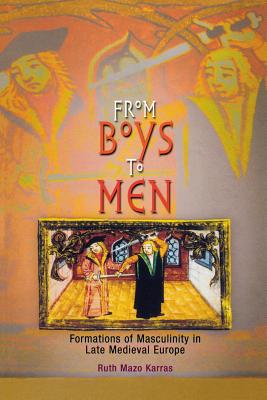From Boys to Men: Formations of Masculinity in Late Medieval Europe

From Boys to Men: Formations of Masculinity in Late Medieval Europe
While the social identity of women in medieval society hinged largely on the ritual of marriage, identity for men was derived from belonging to a particular group. Knights, monks, apprentices, guildsmen all underwent a process of initiation into their unique subcultures. As From Boys to Men shows, the process of this socialization reveals a great deal about medieval ideas of what it meant to be a man--as distinguished from a boy, from a woman, and even from a beast.
In an exploration of the creation of adult masculine identities in the fourteenth and fifteenth centuries, From Boys to Men takes a close look at the roles of men through the lens of three distinct institutions: the university, the aristocratic household and court, and the craft workshop. Ruth Mazo Karras demonstrates that, while men in the later Middle Ages were defined as the opposite of women, this was never the only factor in determining their role in society. A knight proved himself against other men by the successful use of violence as well as by successful control of women. University scholars proved themselves against each other through a violence that was metaphorical and against other men by their Latinity and their use of the tools of logic and rationality. Craft workers proved their manhood by achieving independent householder status. Drawing on sources throughout Northern Europe, including court records and other administrative documents, prescriptive texts such as instructions for dubbing to knighthood, biographies, and imaginative literature, From Boys to Men sheds new light on how young men were trained to take their place in medieval society and the implications of that training for the construction of gender in the Middle Ages. Rescuing maleness from its classification as an ungendered category, From Boys to Men unravels what it meant to be men in a womanless context, revealing the common threads that emerge from the study of young manhood in various disparate institutional settings.PRP: 232.11 Lei
Acesta este Prețul Recomandat de Producător. Prețul de vânzare al produsului este afișat mai jos.
185.69Lei
185.69Lei
232.11 LeiLivrare in 2-4 saptamani
Descrierea produsului
While the social identity of women in medieval society hinged largely on the ritual of marriage, identity for men was derived from belonging to a particular group. Knights, monks, apprentices, guildsmen all underwent a process of initiation into their unique subcultures. As From Boys to Men shows, the process of this socialization reveals a great deal about medieval ideas of what it meant to be a man--as distinguished from a boy, from a woman, and even from a beast.
In an exploration of the creation of adult masculine identities in the fourteenth and fifteenth centuries, From Boys to Men takes a close look at the roles of men through the lens of three distinct institutions: the university, the aristocratic household and court, and the craft workshop. Ruth Mazo Karras demonstrates that, while men in the later Middle Ages were defined as the opposite of women, this was never the only factor in determining their role in society. A knight proved himself against other men by the successful use of violence as well as by successful control of women. University scholars proved themselves against each other through a violence that was metaphorical and against other men by their Latinity and their use of the tools of logic and rationality. Craft workers proved their manhood by achieving independent householder status. Drawing on sources throughout Northern Europe, including court records and other administrative documents, prescriptive texts such as instructions for dubbing to knighthood, biographies, and imaginative literature, From Boys to Men sheds new light on how young men were trained to take their place in medieval society and the implications of that training for the construction of gender in the Middle Ages. Rescuing maleness from its classification as an ungendered category, From Boys to Men unravels what it meant to be men in a womanless context, revealing the common threads that emerge from the study of young manhood in various disparate institutional settings.Detaliile produsului










